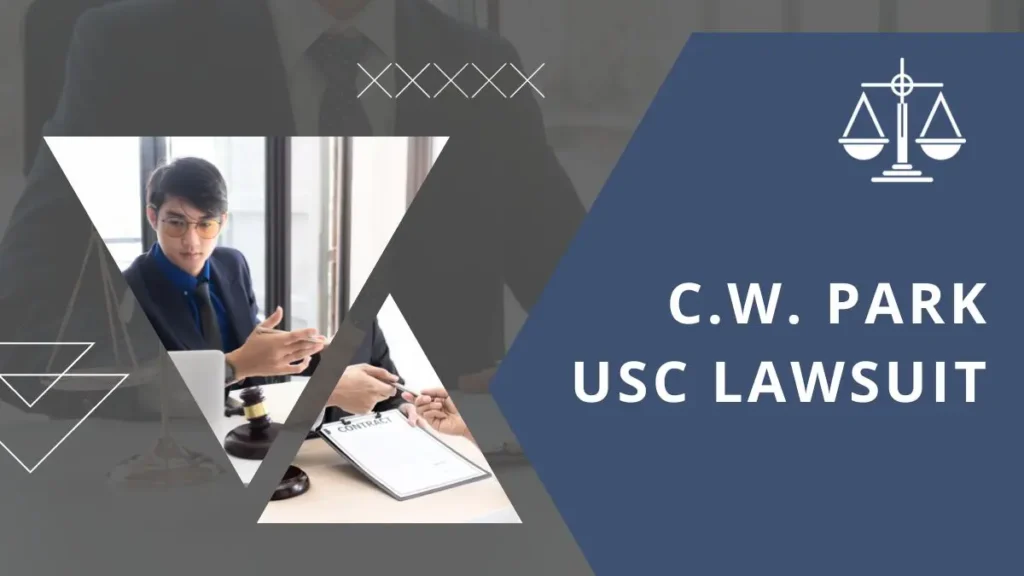The lawsuit filed by C.W. Park against the University of Southern California (USC) has brought significant attention to issues of campus safety and institutional accountability. This case, which centers around allegations of mishandled complaints of sexual misconduct, raises important questions about how universities handle such allegations and the responsibilities they have towards their students and staff. In this article, we’ll explore the key details of the C.W. park USC lawsuit, its implications for USC, and what it means for campus safety and institutional practices across higher education institutions.
Background of the Lawsuit
C.W. Park, a former USC student and faculty member, has brought forward a lawsuit against the university, alleging that USC failed to properly address complaints of sexual misconduct and harassment. According to Park, the university’s handling of these complaints was inadequate, leading to emotional distress and other damages. The lawsuit highlights concerns about how universities manage allegations of sexual misconduct, their policies on reporting and investigation, and their overall commitment to ensuring a safe environment for all campus members.
Key Allegations and Claims
The primary allegations in the lawsuit involve claims that USC did not take appropriate actions in response to Park’s complaints. Park asserts that the university’s response was either delayed or insufficient, failing to provide the necessary support and protection. These claims suggest a broader issue with how universities handle sensitive cases involving sexual misconduct, including the processes for reporting, investigating, and addressing such allegations.
Legal Claims: The lawsuit includes claims for damages, arguing that the mishandling of complaints resulted in significant personal and professional harm to Park. It also calls for systemic changes within USC to improve its handling of sexual misconduct cases.
Implications for Campus Safety
The C.W. park USC lawsuit underscores the need for universities to critically examine their policies and procedures related to campus safety and sexual misconduct. Key implications include:
Reevaluation of Policies:
Universities may need to revisit and strengthen their policies on sexual misconduct to ensure they are effective in preventing, reporting, and addressing allegations. This includes reviewing procedures for handling complaints and providing support for victims.
Increased Transparency:
The case highlights the importance of transparency in how universities handle sexual misconduct allegations. Institutions may need to improve their communication with the campus community about the processes and outcomes related to such cases.
Enhanced Training:
There may be a greater emphasis on training for university staff and administrators on how to handle sexual misconduct cases sensitively and appropriately. This includes ensuring that all personnel involved are well-versed in the legal and ethical responsibilities related to these issues.
Support Systems:
The lawsuit points to the need for robust support systems for individuals who report sexual misconduct. Universities may need to enhance their counseling services, legal support, and other resources available to those affected.
Institutional Accountability
The C.W. Park lawsuit also raises questions about institutional accountability and the role of universities in addressing systemic issues related to sexual misconduct. Key considerations include:
Responsibility of Institutions:
The case emphasizes the responsibility of universities to create a safe and supportive environment for their students and staff. Institutions are expected to handle complaints with seriousness and fairness, ensuring that all parties involved receive appropriate attention and support.
Legal and Ethical Standards:
The lawsuit highlights the need for universities to adhere to legal and ethical standards in their handling of sexual misconduct cases. This includes compliance with federal and state regulations, as well as maintaining high ethical standards in addressing such allegations.
Potential Reforms:
The outcome of the lawsuit could lead to reforms in how universities approach sexual misconduct cases. This may include changes in policies, procedures, and training programs aimed at improving institutional responses and ensuring accountability.
Impact on University Policies
As the legal process unfolds, the C.W. Park lawsuit could influence broader changes in university policies and practices. Institutions may take proactive steps to enhance their handling of sexual misconduct cases and improve campus safety. Potential impacts include:
Policy Overhaul:
Universities may conduct comprehensive reviews of their policies and procedures related to sexual misconduct, making necessary changes to address identified gaps and improve effectiveness.
Increased Oversight:
There may be an increase in oversight of how universities manage sexual misconduct cases, with greater scrutiny from external bodies and stakeholders to ensure compliance and accountability.
Cultural Shifts:
The lawsuit could contribute to a cultural shift within higher education, emphasizing the importance of creating a safe and respectful campus environment. Institutions may adopt new practices and attitudes towards handling sexual misconduct and supporting those affected.
Conclusion
The C.W. Park lawsuit against USC serves as a critical reminder of the importance of campus safety and institutional accountability in handling allegations of sexual misconduct. As the legal proceedings continue, the case has the potential to drive meaningful changes in university policies and practices, ultimately contributing to a safer and more supportive environment for students and staff. By addressing the issues raised in the lawsuit, universities can work towards improving their responses to sexual misconduct and reinforcing their commitment to creating a safe and respectful campus community.
FAQs
Q: What are the main allegations in the C.W. park USC lawsuit against USC?
The main allegations involve claims that USC failed to properly address complaints of sexual misconduct and harassment made by C.W. Park, resulting in significant personal and professional harm.
Q: How might this lawsuit affect campus safety at universities?
The lawsuit may lead to a reevaluation of campus safety policies, increased transparency, enhanced training for staff, and improved support systems for individuals who report sexual misconduct.
Q: What does the lawsuit imply about institutional accountability?
The lawsuit highlights the responsibility of universities. They must handle sexual misconduct cases with seriousness and fairness. They must also adhere to legal and ethical standards and support all parties involved.
Q: Could the lawsuit lead to changes in university policies?
The lawsuit could prompt universities to review and revise their policies and procedures related to sexual misconduct. This could lead to reforms aimed at improving institutional responses and campus safety, potentially creating a safer and more supportive environment.
Q: How can universities improve their handling of sexual misconduct cases?
Universities can improve by strengthening their policies, increasing transparency, and enhancing training for staff to prevent and address sexual misconduct. Additionally, they can provide robust support systems for individuals affected by sexual misconduct. This ensures that those individuals receive the help and resources they need.







